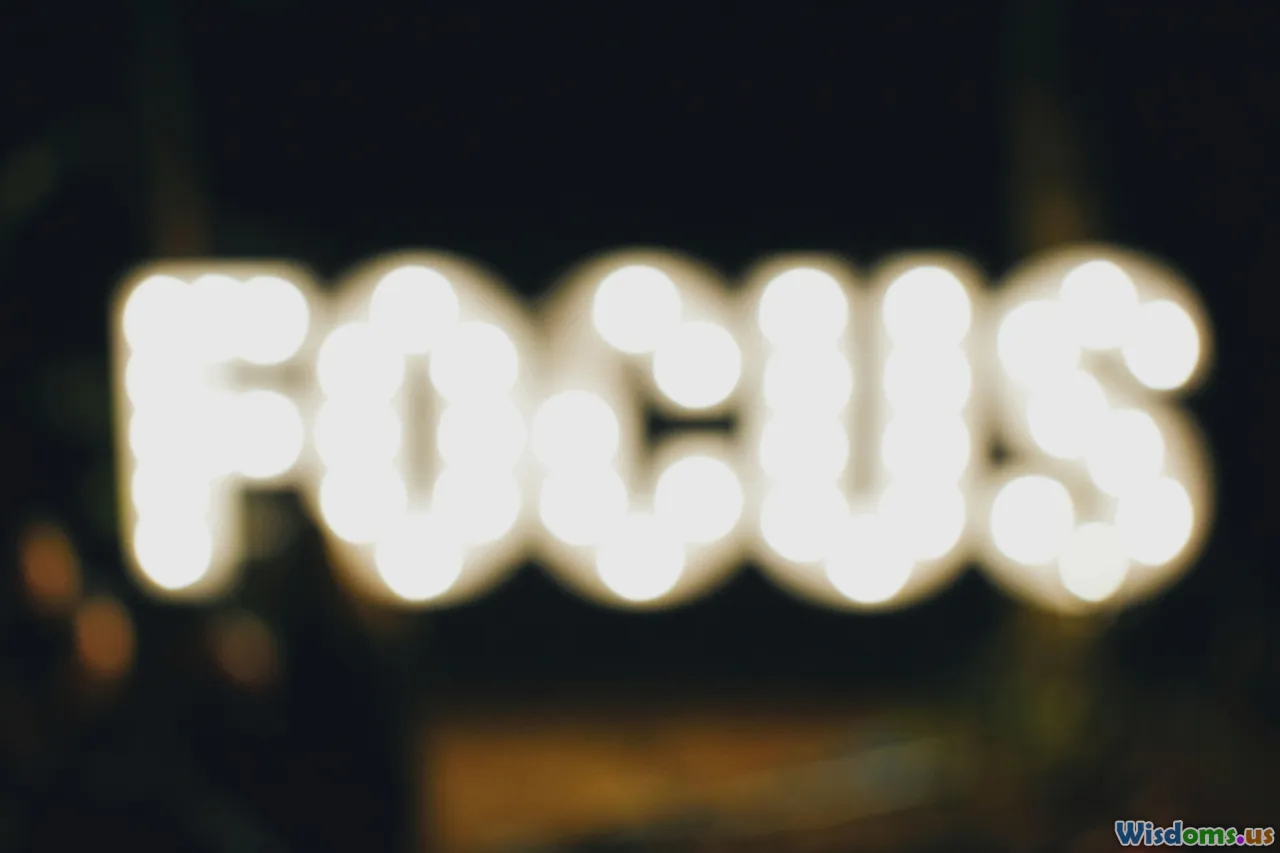
Unlocking Morning Routines That Supercharge Daily Focus
18 min read Discover morning routines scientifically proven to boost daily focus, productivity, and mental clarity for a more successful day. (0 Reviews)
Unlocking Morning Routines That Supercharge Daily Focus
There's a secret shared by high performers, creative visionaries, and elite athletes alike: the way they start their morning shapes the trajectory of their entire day. Take a look at the well-documented routines of Steve Jobs, Maya Angelou, or Tim Cook, and a pattern quickly emerges. While each has a signature spin, all turn to purposeful morning routines as their launchpad for unwavering focus. But what does it look like for you to unlock a morning ritual that not only energizes you but also empowers ferocious, sustained focus—especially in a world crammed with distractions?
Let's explore, step-by-step, the methods backed by science, embraced by the world's best, and adaptable even to the busiest lives.
Why a Purposeful Morning Matters

The way we greet our mornings has ripple effects on concentration, mood, and long-term success. Neuroscientists have found that our first hour awake is when our prefrontal cortex—the region linked to focus and decision-making—is especially malleable. Harnessing this window primed by quality sleep provides disproportionate returns: you can set your brain's "default mode" for peak attention throughout the day.
For instance, the famous psychologist William James once surmised, "The greatest weapon against stress is our ability to choose one thought over another." Meticulously curated mornings reinforce that power of choice. Repeated small actions dial in the larger patterns that shape both productivity and fulfillment.
A 2020 study in the journal Frontiers in Psychology showed that people with intentional morning routines reported 17% higher productivity, greater job satisfaction, and more stable moods. They were also far less likely to experience mid-day focus crashes—a win-win for anyone invested in achieving more, with less stress.
Build-Your-Own Morning Ritual: Core Pillars That Make a Difference

High-utility morning routines tend to draw from several evidence-based domains. Consider structuring your mornings with a few key elements:
1. Move Your Body—Gently or Vigorously
Whether it's five minutes of stretching, a brisk walk outdoors, or a full 30-minute workout, movement floods the brain with oxygen and endorphins. Olympian Michael Phelps starts each morning with light calisthenics, crediting that burst of movement with enhanced clarity before training. You don't need an athlete's regimen—research from the University of Georgia found that even 20 minutes of moderate movement boosts short-term memory and executive function.
2. Mindful Moments: Meditation and Reflection
Meditation isn't just for monks; it's the silent secret behind countless innovators and leaders. Just five to ten minutes can prime your prefrontal cortex and lower cortisol, the body’s primary stress hormone. Oprah Winfrey, for example, swears by her morning meditations as a catalyst for focus and gratitude. If seated meditation doesn't appeal, try mindful breathing or gentle yoga.
3. Journaling, Planning, and Prioritizing
Brain dump lingering thoughts, jot a few priorities, or review your calendar—these steps externalize mental clutter and organize your day. Tim Ferriss, author and podcast host, calls journaling his "am weapon" against anxiety, explaining that it unleashes clarifying power by getting thoughts on paper before reactivity kicks in. Experiment with formats: an open-ended journal, a gratitude list, or the Eisenhower Matrix to sort tasks by urgency and importance.
4. Nutritious, Tech-Minimal Mornings
What you eat and what you don't immediately interact with also affect how your brain fires. registered dietitians recommend a balanced breakfast with complex carbs, lean protein, and healthy fats—think Greek yogurt with berries, or a veggie-packed omelet. But just as crucial is what you avoid: smartphone doom-scrolling or email-checking in bed. Research from the University of British Columbia indicates that early tech exposure increases distractibility by 28%.
Experimenting with these pillars—and adjusting according to your lifestyle—means your routine is not rigid but resilient, ready to support peak states anytime.
Case Studies: How the World’s Most Focused People Start Their Day

Let’s peel back the curtain on three high performers, whose public or well-documented routines reveal actionable insight:
1. Tim Cook (CEO of Apple)
- Wake-up: 5:00 a.m.
- Routine: Immediately tackles email "to know what’s urgent for the day,” then hits the gym before sunrise. The disciplined order sets his mind first for external demands, then clears stress with endorphin-producing movement.
- Takeaway: For those with demanding inboxes, answering urgent emails early can reduce anxiety—if paired with movement afterward for recalibration.
2. Maya Angelou (Writer & Activist)
- Wake-up: 5:30 a.m.
- Routine: Leaves home for a hotel room, creating a distraction-free composition space. She writes from 7:00 a.m. until midday, after a simple breakfast and cup of coffee, then leaves her notes behind for work-life separation.
- Takeaway: Physical change of environment and ritualized writing blocks deepen focus. Often, separating ‘work’ from ‘home’ (even by shifting to a distinct desk or room) primes the brain for creativity.
3. Dr. Rangan Chatterjee (NHS GP, Bestselling Author)
- Routine: Morning movement, followed by sunlight exposure and gentle breathwork meditation—before checking his phone or emails shifts his brain into reactive mode to set a calm baseline for clinical practice.
- Takeaway: Exposure to natural light and deliberate calm greatly strengthens morning focus.
While these approaches differ, each illustrates a tailored approach—a powerful reminder that you can and should steer your own optimal start, rather than chasing rigid perfection.
Deconstructing the Science: Why These Routines Snap the Brain To Attention

Why are morning rituals so powerful? Neuroscientific findings point to several mechanisms:
Circadian Rhythm Mastery: The human brain operates on a roughly 24-hour rhythm, fine-tuned by natural light and habitual cues. Morning rituals that include sunlight exposure (even five minutes on a balcony or open window) anchor your internal clock. This circadian entrainment regulates melatonin, the "sleep hormone"—and wakes up the brain for optimized cognitive performance and energy levels throughout the day.
- Example: A Stanford University study, 2021, revealed that participants who spent 10 minutes outside within an hour of waking reported significantly sharper focus two hours later, compared to those exposed solely to artificial light.
The Primacy Effect: Psychologists have long documented the "primacy effect"—the phenomenon where people are more likely to remember, repeat, and emphasize the first actions or thoughts of the day. Stacking purposeful intentions (like journaling or positive visualization) at the top of your morning literally carves neural pathways that increase the likelihood those mindsets will persist.
Cortisol: Friend or Foe? Cortisol naturally spikes in the early morning, lending you alertness. Purposeful routines with gentle movement or mindfulness allow optimal harnessing of this peak. If misdirected, this cortisol surge drifts into anxiety or doom-scrolling; when captured through focus-friendly rituals, it fosters readiness without overwhelm.
Creating Consistency: How to Stick with Focus-Boosting Mornings
Setting a morning routine is easier than sticking to it, especially as sleep cycles, family duties, or work emergencies intrude. Here’s how to cement the benefits of your personalized focus routine:
1. Start Small, Then Stack Adopt the "two-minute rule." Begin with a foundational habit, like making your bed or two minutes of mindful breathing, and add components incrementally. James Clear, author of Atomic Habits, recommends habit stacking—lodging a new behavior (like sipping water after brushing your teeth) onto an existing routine for frictionless adoption.
2. Track and Adjust Keep a habit tracker, journal, or even a daily calendar note to celebrate routines you complete. When travel or chaos intervenes, adapt—pack elastic bands for stretches, switch to a three-breath mindfulness practice, or swap breakfast for something portable. The key is resilience, not rigidity.
3. Externalize Commitment Tell a partner or friend about your focus-boosting commitment, or use accountability apps like Habitica or Streaks. Research from the Dominican University of California shows that people who share goals with others have a 65% greater chance of sticking to them over a 4-week period.
Troubleshooting Common Barriers

Even with crystal-clear intentions, real life can intrude on your morning aspirations. Here’s how to navigate around the thorniest sticking points:
Barrier: Lack of Time
- Solution: Prepare the night before—set out workout clothes, pre-prempt breakfast, or jot tomorrow's top priorities for a frictionless launch. If mornings are brief, focus on just one keystone habit.
Barrier: Early Tech Temptation
- Solution: Charge your phone outside the bedroom. Buy an old-fashioned alarm clock or set "no device" rules for your first 30 minutes. Some people find success with apps like Forest, which lock certain functions until a set time.
Barrier: Poor Sleep or Fatigue
- Solution: Address the root with better sleep hygiene (dim lights at night, no heavy evening meals, consistent bedtime routines) to make rising early less brutal. On groggy days, a splash of cold water, morning sunlight, and slow, gentle stretching can reboot your system.
Barrier: Motivation Wanes After a Week
- Solution: Change up the details so the routine feels fresh: vary your breakfast, play different music, or alternate between meditation styles. Small novelties nourish the brain and stave off monotony-induced slip-ups.
Real-World Examples: Adaptations For Every Lifestyle

Don't have the luxury of long, quiet mornings? Your routine can still work for you. Here are concrete sample blueprints:
For Busy Parents:
- Wake up 15 minutes before the household.
- Five minutes: gentle stretching beside the bed.
- Five minutes: review priorities or gratitude list on the kitchen counter.
- Five minutes: enjoy coffee or tea quietly, no screens.
For Work-From-Home Professionals:
- Start with sunlight—open blinds or step outside, even briefly.
- Simple bodyweight moves or desk stretches.
- Use a bullet journal to set boundaries: What are my most impactful tasks today?
- Avoid email until after breakfast to center rather than react.
For Students:
- Quick desk tidy (reduces mental clutter).
- Alternate days: meditation or short jog.
- Plan key study topics, setting a concrete goal ("review two chapters before lunch").
These can be mixed, matched, and remixed to fit travel, changing shifts, or any unorthodox schedule.
Next-Level Enhancements: Advanced Tactics for Peak Morning Focus

Once you’ve cemented your new rituals, try elevating your mornings with extra-layer enhancements:
1. Cold Exposure: A European Journal of Physiology study (2019) found cold showers or brief cold face splashes can spark alertness and reduce perceived stress for hours. Try a 30-second cold finish after a warm shower.
2. Motivational Cue Cards: Write down a favorite quote or daily affirmation, keeping it by your mirror or coffeemaker. This primes the brain to aim high, as the repetition of encouraging ideas fosters goal-directed neural patterns.
3. Sunlight-Assisted Meditation: Combine light exposure and meditation—meditate facing a sunlit window or step outside for a few deep breaths. This stacks the circadian and mindfulness benefits for maximal neurochemical impact.
4. Strategic Caffeine Use: Drinking coffee after a glass of water and some movement diminishes the post-caffeine crash, making its focus-boost sharper and more sustained.
5. Brief Novel Learning: Read one page of inspirational or novel material (a biography or poem, rather than news or social media) after your primary routine. The brain rewards novelty early in the day with lasting dopamine, which is linked to higher motivation.
Crafting Your Signature, Future-Proof Routine
Creating a morning routine that infuses your day with focus isn't about rigid rules—it's about principled experimentation. Borrow from research, co-opt the best ideas from pros, but ultimately, let your personality and needs dictate the final formula. Reset your approach when life shifts or monotony sets in.
Revisit your intention semifinally: What’s a feeling or state you want your morning to ignite? Clarity? Courage? Calm? Orient your first hour’s actions toward nurturing it. As Aristotle said, “We are what we repeatedly do. Excellence, then, is not an act, but a habit.”
Sculpt a morning ritual that feels restorative, sustainable, and powerful—one capable of carrying you, focused and unshaken, through whatever each day may bring.
Rate the Post
User Reviews
Other posts in Healthy Habits
Popular Posts















